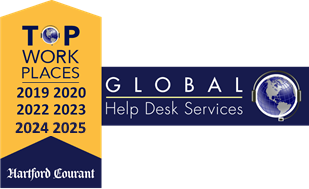Fact: The reputation of your entire IT department can suffer quick and brutal damage if users are unhappy with your help desk.
And yet, so many companies set their outsourced IT help desk up for failure, resulting in low first-call resolution, frustrated users … and a deepening sense of buyer’s remorse.
Where are things going so wrong?
As it turns out, many businesses view their outsourced help desk as a cost center; a necessary evil that must be tightly controlled with a restrictive scope of work.
As a result, agents often find themselves unable to help a user … even if they’re perfectly capable of doing so.
Here’s what happens as a result.
What Happens When You Don’t Empower Your Outsourced Help Desk
Before you empower your outsourced help desk agents, understand what happens when you don’t. Here are three consequences you should expect if you fail to empower your outsourced help desk.
1. Resource Costs Increase
When your outsourced help desk is unable to resolve issues on first contact, you’re frequently forced to reassign these issues to another support group with higher-level priorities, often without the ability to set clear expectations or follow-through on them.
These groups are now tasked with resolving requests that the help desk really could have resolved, which takes time away from their primary responsibilities and robs you of technically skilled, costly resources.
2. Customer Satisfaction Decreases
When your various IT support teams are overtasked, customer satisfaction suffers. Consistency, availability and quality of service all suffer while customer satisfaction plummets.
Just ask your users. Most of them will gladly recount the frustration of being told their problem can’t be solved or that someone will have to get back to them.
Though an issue might seem trivial on the surface, the user often needs an immediate solution just to get back to work. They can’t wait hours or days with the thin comfort of a ticket number and assurance of a call back.
3. Support Goes Underground
When your users fail to get the answers they need from your outsourced help desk, what do they do? They call their “favorite IT guy” on staff or, even worse, a tech-savvy-friend.
For your business, these are both bad options. Though this “shadow IT” does help a user get back to work faster, the issue has now escaped your system.
Following these paths puts your company’s security at risk and wastes the time of higher-level agents who must research a problem already resolved, not to mention the impact on data capture and accurate reporting.
Four Ways to Give the Power of ‘Yes’
Here’s how to give your outsourced help desk agents the power to say “Yes” in four ways.
1. Give Agents System Access
Appropriately staffing a dedicated help desk is a good start. But even then, your best intentions will be thwarted unless you also enable them to provide help at its fullest potential.
Empower your outsourced help desk agents by giving them access to the systems, training and knowledge base they need to truly help the majority of users, instead of continually passing them up to the next tier.
2. Deliver Adequate Training
Without training and documented processes, you can expect high levels of stress and feelings of being overwhelmed, leading to high agent turnover.
Work with your help desk vendor to create predictable, repeatable processes, so agents know what’s expected of them every day when they come in.
Deliver training for your outsourced help desk employees that combines training on these predictable, repeatable processes with the specific systems they’ll be supporting. Adequate training is crucial for ensuring quality performance.
- Whenever possible, base your ongoing training on issues you spot in your help desk metrics. Examine your KPIs to discover trends in your first call resolution rates, average time on hold, average handle time, customer satisfaction scores and other vital metrics you’re trying to improve.
- Then work with your outsourced help desk to find the drivers behind these trends. If you notice, for example, that your average handle time is creeping up, and if you discover that the reason for this trend is agents skipping a vital early step in their calls, then deliver some remedial training to resolve this issue.
The key to improving outsourced help desk performance is measurement followed by training. You work with your outsourced IT help desk vendor to clearly identify the problems, while giving the team the tools they need to succeed.
3. Engage With Your Agents
Help desk agents are in the talking business. But one of the most common causes of poor agent performance is poor communication.
Your outsourced IT help desk, who spends their shifts talking and emailing and chatting and texting, might just have difficulty communicating: Not with users and customers, but with management and with each other. They may struggle to understand what is wanted from them. Equally, they may have excellent ideas for improvement, but lack the opportunity to share them.
The cure for poor and infrequent communication is better and more frequent communication. Aim to achieve communication with a purpose. Encourage your outsourced help desk to communicate with you clearly, often and with candor.
4. Keep Your Knowledge Base Current
The fourth and final way to empower your outsourced help desk agents is to keep your knowledge base as up to date as possible.
One way to do this is by turning successful resolutions into knowledge base articles.
During the year—either quarterly, monthly or weekly—get your help desk to query the ticket handling system for resolved tickets that don’t have a corresponding article in the knowledge base. The best place to start is with tickets that are flagged “No Knowledge Found.” Check to make sure this is true. If it is (that is, there’s indeed no knowledge), create it.
Empower your agents by gathering all tickets for the resolved issue and then creating an article that describes the issue, outlines the steps needed to resolve the issue and so on. Then make sure your outsourced help desk partner tags and categorizes the articles so agents find them quickly and easily.
Empower Your Outsourced Help Desk and See More Value
Eleanor Roosevelt once said, “Never allow a person to tell you no who doesn’t have the power to say yes.”
Giving your outsourced help desk the power to say, “Yes, I can help you with that right now!” is the single best thing for your users, your IT team and your business.
Just remember: You don’t empower help desk agents with technology alone. Empowerment comes through enablement. Tools have their place in boosting agent performance. But the secret sauce is agent enablement. Agents can do so much more when relevant systems are accessible, when knowledge base articles are accurate and up to date, when they have adequate training on the processes outside their current scope, and when you give them the power to say “yes.”
If you need help empowering your outsourced help desk agents, download our complimentary e-book: Help Desk ROI: It’s Not Just Financial.



